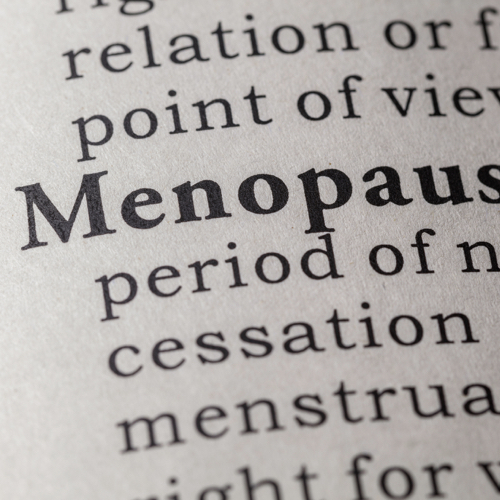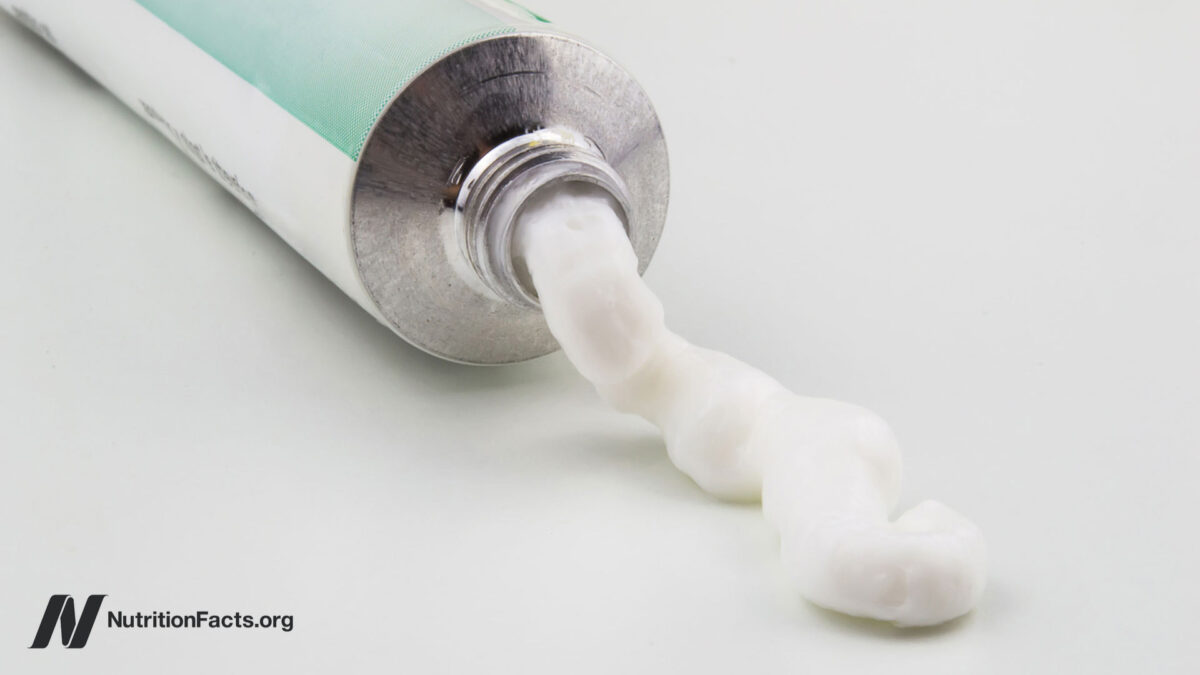
Menopause
Menopause Symptoms
A woman is considered to be postmenopausal after 12 consecutive months without a menstrual period. In the United States, the average age at menopause is 51.5. About 20 percent of women escape symptom-free, whereas 20 percent at the other end of the spectrum face severe symptoms from the accompanying hormonal changes. Hot flashes and night sweats typically last about five to seven years but may exceed a decade in 10 to 15 percent of individuals.
The Risks of Hormone Replacement Therapy
By the 1990s, up to 40 percent of menopausal women in the United States were on hormone replacement therapy drugs, raking in billions of dollars a year for the pharmaceutical industry. But then the revelations of the Women’s Health Initiative and the Million Women Study were published, indicating elevated risk for breast cancer, blood clots, and endometrial cancer. The use of menopausal hormone therapy plummeted by 80 percent, along with a subsequent sharp and significant reduction in breast cancer rates.
The U.S. Preventive Services Task Force, echoing other authorities, such as the American Academy of Family Physicians, American Geriatrics Society, and American Heart Association, now recommends against the use of hormone therapy for the prevention of chronic conditions in postmenopausal women with or without a uterus. (Note that the guidance is separate from hormone therapy for the treatment of severe menopausal symptoms.)
Diet for Treating Menopause Symptoms
Those eating strictly plant-based diets report significantly fewer bothersome symptoms around menopause. This included the vasomotor symptoms, such as hot flashes and night sweats, as well as other physical symptoms of menopause, like muscle and joint aches, fatigue, sleep difficulties, reduced strength and stamina, lethargy, skin changes, weight gain, facial hair, bloating, and urinary frequency or incontinence. Researchers conclude: “Eating a plant-based diet may be helpful for women in menopausal transition who prefer a natural means to manage their symptoms.”
Fruits, vegetables, soy, and plant-based omega-3-rich foods, such as flaxseeds, correlated with lesser symptom severity, whereas meat, dairy, and fish-based omega-3s were associated with more severe menopausal symptoms. In general, those eating higher-quality diets, including more fruits, vegetables, and whole grains, tend to suffer less from vasomotor, physical, and psychological symptoms. On the other hand, diets high in processed foods, sweets, meats, and saturated fat were linked to more severe symptoms.
For substantiation of any statements of fact from the peer-reviewed medical literature, please see the associated videos below.
Image Credit: Devonyu / Thinkstock. This image has been modified.
Popular Videos for Menopause


Soy Phytoestrogens for Menopause Hot Flashes
Does soy food consumption explain why Japanese women appear to be so protected from hot...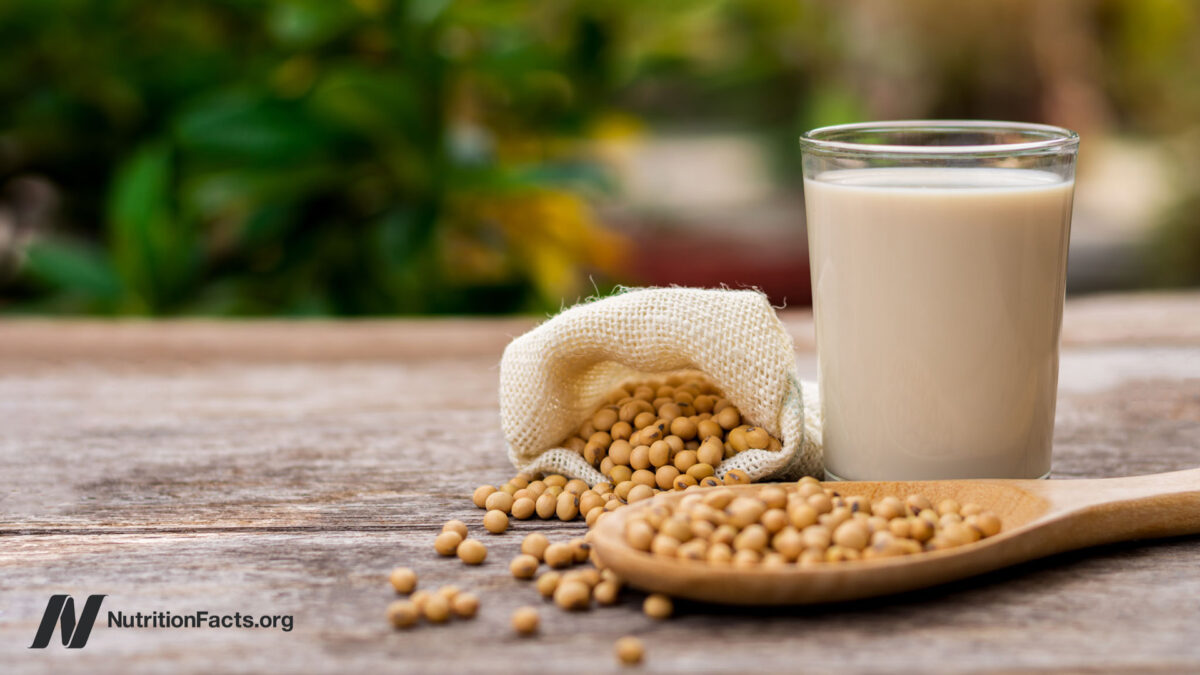
Soy Milk for Vaginal Menopause Symptoms
Soy foods may explain why Japanese-American women not only have the lowest rates of hot...
Soy Foods for Menopause Hot Flash Symptoms
Soy can be considered a first-line treatment for menopausal hot flash and night sweat symptoms.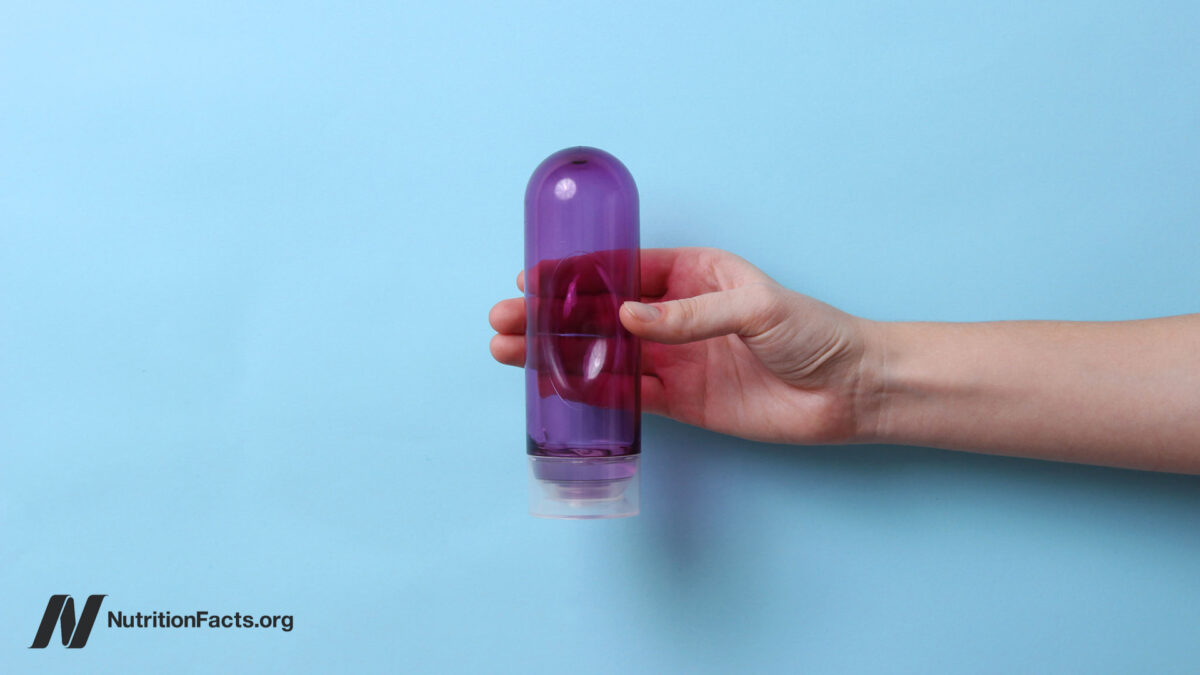
The Best Moisturizers and Lubricants for Vaginal Menopause Symptoms
I discuss the first-line management of genitourinary syndrome of menopause (vulvovaginal atrophy).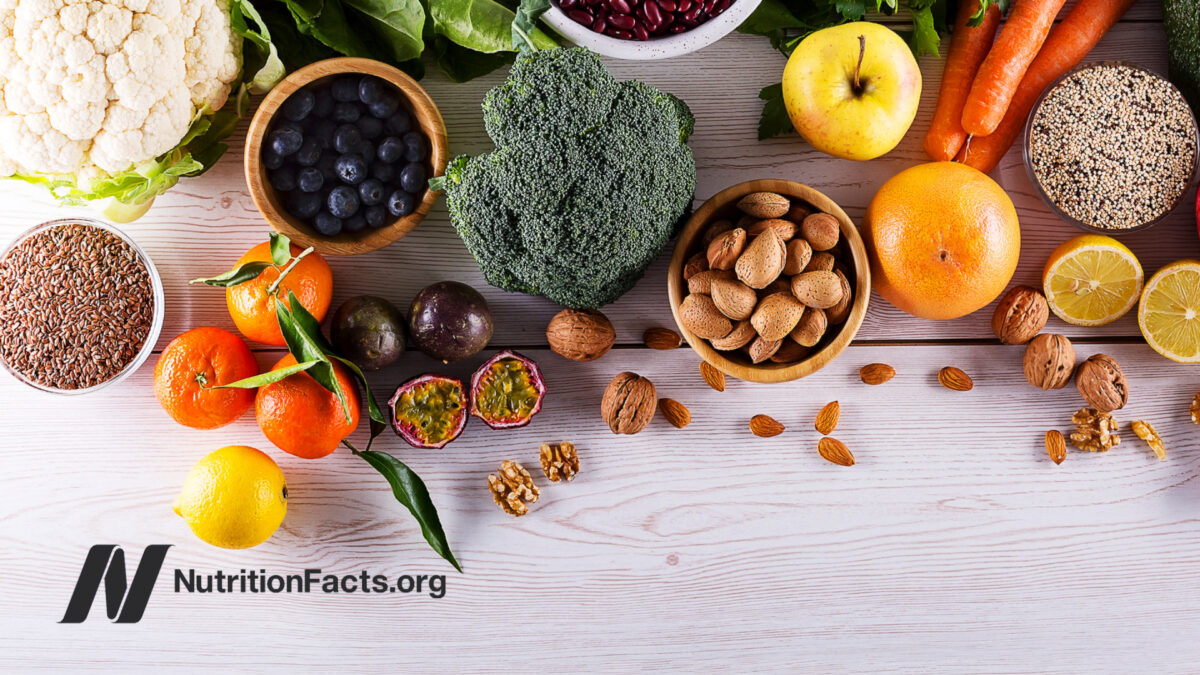
Dietary Approach to Naturally Treating Menopause Symptoms
Specific foods have been shown in randomized controlled trials to improve symptoms like hot flashes.All Videos for Menopause
-

Do Ashwagandha, Ginseng, and Maca Root Have Benefits for Female Sexual Dysfunction?
Which of these three works, which doesn’t, and which may be too toxic to take safely?
-

Testosterone “Replacement” Therapy in Postmenopausal Women for Libido
Currently, there are more than 30 FDA-approved testosterone products for men, but none for women.
-

Is FDA-Approved Bioidentical Hormone Replacement Therapy Safe?
As of 2019, there are urine-free FDA-approved bioidentical hormones that skirt the standardization concerns of compounded preparations. Are they any safer?
-

Side Effects of Resveratrol Supplements
Resveratrol supplements may blunt some of the positive effects of exercise training.
-

Resveratrol Tested for Alzheimer’s, Arthritis, and Osteoporosis
Resveratrol appears to triple the rate of age-related brain shrinkage.
-

How to Boost Collagen Synthesis with Diet
Which foods can increase collagen deposition and prevent wrinkles?
-

How to Delay the Age of Menopause with Diet and Lifestyle Factors
Approximately half of the variability of age of menopause among women is explained by genetics. What behaviors or circumstances can help explain the rest?
-

How Well Do Medicines Like Fosamax Work to Treat Osteoporosis?
Doctors and patients alike vastly overestimate the power of bisphosphonate drugs to prevent fractures.
-

How Not To Age – Live Presentation
In this live lecture, Dr. Greger offers a sneak peek into his latest book, How Not to Age, a New York Times Best Seller.
-

Soy Foods for Menopause Hot Flash Symptoms
Soy can be considered a first-line treatment for menopausal hot flash and night sweat symptoms.
-

Menopausal Hot Flashes Are Not Inevitable
Why do 85 percent of menopausal women suffer hot flashes in some countries but only 15 percent in others?
-

Soy Milk for Vaginal Menopause Symptoms
Soy foods may explain why Japanese-American women not only have the lowest rates of hot flashes in the United States but also have the lowest rates of vaginal dryness.
-

Hormone Treatment (Estrogen Pills and Creams) for Vaginal Menopause Symptoms
Does vaginal estrogen carry the same risk as oral estrogen?
-

The Best Moisturizers and Lubricants for Vaginal Menopause Symptoms
I discuss the first-line management of genitourinary syndrome of menopause (vulvovaginal atrophy).
-

Yoga Put to the Test for IBS, Inflammatory Bowel, Menopause, and Osteoporosis
A study using sham acupuncture underscores the necessity of controlling for expectancy effects.
-

Dietary Approach to Naturally Treating Menopause Symptoms
Specific foods have been shown in randomized controlled trials to improve symptoms like hot flashes.
-

Fenugreek Benefits for Sexual Function, Painful Periods, and Milk Production
The hormonal benefits of fenugreek extend beyond the muscle-bulking testosterone boost.
-

Benefits of Black Cumin Seed (Nigella Sativa) for Weight Loss
For three cents a day, black cumin may improve cholesterol and triglyceride levels, blood pressure, and blood sugar control, as well as accelerate the loss of body fat.
-

The Effects of Obesity on Back Pain, Blood Pressure, Cancer, and Diabetes
Losing weight can reduce sciatica, hypertension, and cancer risk, and reverse type 2 diabetes.
-

The Effects of Hormones in Dairy Milk on Cancer
What are the effects of the female sex hormones in milk on men, women, and children?
-

How Much Lead Is in Organic Chicken Soup (Bone Broth)?
Let’s review lead from occupational exposures, shooting ranges, eggs, and bone broth.
-

How to Convert Into an Equol Producer
Certain gut bacteria can supercharge the benefits of soy foods, resulting in even more bone protection, better control of menopausal symptoms, and lower prostate cancer risk, but how can we foster the growth of these good bacteria?
-

Soy Phytoestrogens for Menopause Hot Flashes
Does soy food consumption explain why Japanese women appear to be so protected from hot flash symptoms?
-

Should Pregnant Women Take Calcium Supplements to Lower Lead Levels?
What are the effects of sodium and calcium intake on blood lead levels in pregnant and breastfeeding women?
-

The Rise in Blood Lead Levels at Pregnancy and Menopause
The lead trapped in our skeleton can leach back into our bloodstream when we temporarily or permanently lose bone due to pregnancy, weight loss, menopause, or osteoporosis.
-

The Best Diet for Fibroids
The same diet that helps regulate hormones in women may also reduce exposure to endocrine-disrupting pollutants.
-

Is it Worth Getting Annual Health Check-Ups?
What are the risks and benefits of getting an annual check-up from your doctor?
-

How to Block Breast Cancer’s Estrogen-Producing Enzymes
What happens to hormone levels in women and men randomized to drink soy milk?
-

Donating Blood to Prevent Heart Disease?
An extraordinary thing happened when those at high risk for heart disease were randomized to give blood—and it had nothing to do with their heart.
-

Who Shouldn’t Eat Soy?
How can soy foods have it both ways with pro-estrogenic effects in some organs that can protect bones and reduce hot flash symptoms, yet also anti-estrogenic effects in others that protect against breast and endometrial cancer?
-

How Did Doctors Not Know About the Risks of Hormone Therapy?
Women were placed in harm’s way by their physicians, who acted as unsuspecting patsies for the drug companies.
-

What Are the Effects of the Hops Phytoestrogen in Beer?
When it comes to breast cancer risk, does the phytoestrogen in beer act more like the animal estrogens in Premarin or the protective phytoestrogens in soy?
-

Almonds for Osteoporosis
What happens when you take blood from people before and then again four hours after almond consumption, and drip that blood on bone cells?
-

Why Do Vegan Women Have 5x Fewer Twins?
The hormones naturally found in foods of animal origin may help explain why women who eat conventional diets are five times more likely to give birth to twins than those eating plant-based diets.
-

Prolonged Liver-Function Enhancement from Broccoli
The boost in detoxifying enzymes triggered by cruciferous vegetable consumption may last for weeks!
-

Plant-Based Bioidentical Hormones
Do compounded bioidentical hormones for menopause carry the same risks as conventional hormone replacement drugs, such as Premarin?
-

How Plant-Based to Lower IGF-1?
Those eating vegan had significantly lower IGF-1 levels and higher IGF-binding proteins than those just eating vegetarian, suggesting that the more plant-based one’s diet becomes, the lower one’s risk of fueling growth hormone-dependent cancer growth.
-

Risk Associated with Iron Supplements
Iron is a double-edged sword. If we don’t absorb enough, we risk anemia; but if absorb too much, we may increase our risk of cancer, heart disease, and a number of inflammatory conditions. Because the human body has no mechanism to rid itself of excess iron, one should choose plant-based (non-heme) sources, over which our body has some control.
-

Breast Cancer Survival and Soy
All three human studies on soy and breast cancer survival suggest that soy in sufficient amounts may improve survival in women diagnosed with breast cancer.
-

Breast Cancer Survival & Lignan Intake
One teaspoon of flax seeds may double one’s daily production of lignans—phytonutrients that appear to play a role in both breast cancer prevention and survival.
